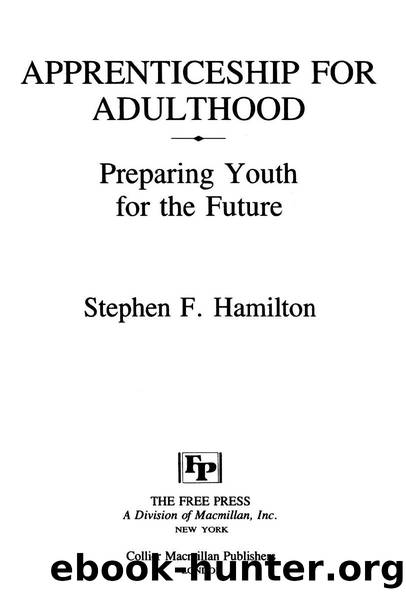Apprenticeship for Adulthood by Stephen F. Hamilton

Author:Stephen F. Hamilton
Language: eng
Format: epub
Publisher: The Free Press
Published: 1990-07-15T00:00:00+00:00
Social studies begins after lunch, at one o’clock. Herr Reuter is nearing retirement. He projects liveliness and authority. No one misbehaves as he calls the roll. Calling attention to news broadcasts about the twenty-fifth anniversary meeting of NATO leaders in Turkey, he asks a series of questions. The paucity of responses leads him to quip, “Thought questions are not appreciated. Factual questions are easier.” Finally, in answer to the question, “What is new in NATO?” a pupil answers that the United States wants the European countries to pay more for defense. The teacher agrees and says the second thing is that the Americans want to develop a space-based defense. “Both,” he adds, “will cost you money.”
Questioned about interest rates, pupils are able to offer that they are higher in the United States and that the result is climbing interest rates in Germany. The teacher explains that higher interest rates reduce investment and that means fewer workplaces. He stresses that it is important to understand the connections among things, in this case between increased arms spending, higher interest rates, reduced nonmilitary investment, and shortage of workplaces. “How people could live!” he exclaims, if there were no arms race.
Further discussion of investment leads to a question about how Japanese auto makers became so competitive with Germany for the export trade. He answers that they invested while the Germans consumed. The Germans were too self-satisfied. Although the VW beetle was outmoded, it was not changed. Then suddenly it was displaced in world markets by newer Japanese small cars. But now Volkswagen is strong again and, he says, Japanese experts are visiting German auto plants again.
Herr Reuter writes on the board: “Strukturkrise” and “Konjunkturkrise” (structural crisis and cyclical economic crisis). As an example of a structural crisis, he says that Germany used to sell complete steel mills to third world countries and now those countries are producing cheaper steel. Germany can compete now in the world market only in those industries where skilled workers and advanced technical knowledge are required, he explains. A pupil offers the opinion that the 35-hour workweek, a current and highly controversial union demand, is not possible because of international competition.
Download
This site does not store any files on its server. We only index and link to content provided by other sites. Please contact the content providers to delete copyright contents if any and email us, we'll remove relevant links or contents immediately.
| Administration | Assessment |
| Educational Psychology | Experimental Methods |
| History | Language Experience Approach |
| Philosophy & Social Aspects | Reform & Policy |
| Research |
The Art of Coaching Workbook by Elena Aguilar(51149)
Trainspotting by Irvine Welsh(21631)
Twilight of the Idols With the Antichrist and Ecce Homo by Friedrich Nietzsche(18614)
Fangirl by Rainbow Rowell(9224)
Periodization Training for Sports by Tudor Bompa(8247)
Change Your Questions, Change Your Life by Marilee Adams(7732)
This Is How You Lose Her by Junot Diaz(6868)
Asking the Right Questions: A Guide to Critical Thinking by M. Neil Browne & Stuart M. Keeley(5751)
Grit by Angela Duckworth(5592)
Red Sparrow by Jason Matthews(5462)
Paper Towns by Green John(5173)
Room 212 by Kate Stewart(5102)
Ken Follett - World without end by Ken Follett(4716)
Housekeeping by Marilynne Robinson(4433)
The Sports Rules Book by Human Kinetics(4377)
Double Down (Diary of a Wimpy Kid Book 11) by Jeff Kinney(4257)
Papillon (English) by Henri Charrière(4251)
The Motorcycle Diaries by Ernesto Che Guevara(4081)
Exercise Technique Manual for Resistance Training by National Strength & Conditioning Association(4054)
